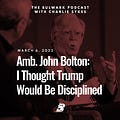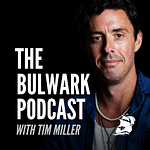John Bolton thought he could create a coherent foreign policy for Trump, but now sees he was naive. Plus, Charlie Sykes asks Bolton about his early defense of Trump's relations with Putin — and why he didn't testify during the first impeachment. Bolton spoke with Sykes at the Principles First Summit.
Share this post

Amb. John Bolton: I Thought Trump Would Be Disciplined
www.thebulwark.com
Amb. John Bolton: I Thought Trump Would Be Disciplined
Ad-Free Version
Mar 06, 2023
∙ Paid
The Bulwark Podcast
Audio
Tim Miller and guests discuss the latest political news for the flagship podcast of the Never Trump movement and the reality-based community. Every weekday we provide insightful analysis, political hot-takes, an unabashed defense of liberal democracy and long-form interviews that cut through the "both-sides" BS. Plus a few laughs to help you wash down the crazy.
An ad-free edition is exclusively available for Bulwark+ members.
Tim Miller and guests discuss the latest political news for the flagship podcast of the Never Trump movement and the reality-based community. Every weekday we provide insightful analysis, political hot-takes, an unabashed defense of liberal democracy and long-form interviews that cut through the "both-sides" BS. Plus a few laughs to help you wash down the crazy.
An ad-free edition is exclusively available for Bulwark+ members.Listen on
Substack App
Apple Podcasts
Spotify
YouTube Music
YouTube
Overcast
Pocket Casts
RSS Feed
Recent Episodes













